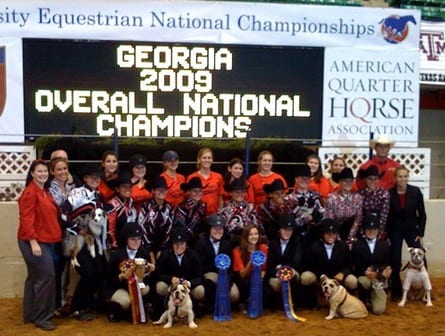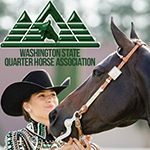The NCAA Varsity Equestrian National Championships, which take place again this year in Waco, Texas,
April 15-17, are the pinnacle of the sport. The rosters read like World
Championship show programs and the patterns rival that of the finals.
Even the barns feel like you are at the World Show as each team has their
own stall decorations, just like the different states do. The top
riders in AQHA and APHA are continuing to find their way into the
collegiate arena, after richly decorated youth careers.
Katy Biffle, a highly accomplished AQHA rider and former member of the University of South Carolina Varsity Equestrian Team, examines Varsity life through the eyes of current riders who entered the sport after years of success on the AQHA circuit.
************************************************
Recently, I found myself taking a step back to remember what it’s like to be in college. There were memories of long study hours and even longer nights of fun. But what stood out the most was my experience on a Varsity Equestrian team. I was very fortunate to grow up involved in the horse industry through AQHA and I continued to grow as a rider in the Varsity Equestrian program at the University of South Carolina. Looking back today, the most rewarding part of competing is recognizing that the sport that brought so much joy into my life has continued to grow, and grow rapidly. As it was a few
years ago, the brightest stars from the horse industry continue to
represent their respective schools with poise and humility.
Varsity Equestrian officially came into existence in 1998 and many young women from the AQHA and APHA show world have taken advantage of the chance to continue to ride and compete while attending college. When these young ladies (listed below) completed their youth show careers, they were accomplished and talented riders who were able to earn a coveted spot on a Varsity Equestrian team. I had a chance to visit with some current Varsity Equestrian standouts and they shared their thoughts and gave an insiders view about the sport that we love so much.

Lauren Love
Hometown: College Station, Texas
Senior at the University of Georgia
Major: Financial Planning
[NPI]/Media/0/jpg/2009/6/1d24ac2d-1ec9-b7d0-76b6ae84214ae4a7.jpg[/NPI]
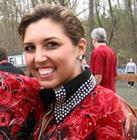
Taylor Singmaster
Hometown: Lansdale, Pennsylvania
Sophomore at the University of South Carolina
Major: Studio Art
[NPI]/Media/0/jpg/2009/6/1d24ac2d-1ec9-b7d0-76b6ae84214ae4a7.jpg[/NPI]
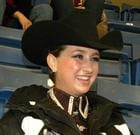
Carey Nowacek
Hometown: San Antonio, Texas
Freshman at Texas A&M
Major: General Studies
[NPI]/Media/0/jpg/2009/6/1d24ac2d-1ec9-b7d0-76b6ae84214ae4a7.jpg[/NPI]

Indy Roper
Hometown: Hobart, Indiana
Freshman at Auburn University
Major: Finance
[NPI]/Media/0/jpg/2009/6/1d24ac2d-1ec9-b7d0-76b6ae84214ae4a7.jpg[/NPI]
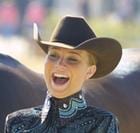
Johnna Letchworth
Hometown: Harwinton, Connecticut
Freshman at the University of South Carolina
Major: Undecided
[NPI]/Media/0/jpg/2009/6/1d24ac2d-1ec9-b7d0-76b6ae84214ae4a7.jpg[/NPI]
Making the leap: How do you make the decision to ride in college?
The decision to ride in college is a big one. You cannot simply call up the coaches and ask to be on the team. Collegiate riders are recruited just like any other sport. The NCAA strictly regulates what can and cannot be done during the recruiting process. The rules and regulations set forth by the NCAA are to keep it fair for the potential student athletes across the board. It can be a confusing process, but the coaches and athletic support staff are ready to help.
For example, one of the biggest recruiting rules is how and when the coaches can have contact with the potential student athletes. The coaches may receive telephone calls at any time from a potential student athlete, but they are not permitted to return them until after July 1st of the summer between the potential athlete’s junior and senior year of high school.
The coaches may receive telephone calls at any time from a potential student athlete, but they are not permitted to return them until after July 1st of the potential athlete’s senior year of high school. Written communication, however, can take place beginning September 1st of the potential student athlete’s junior year of high school. So what do you do if you want to ride in college, but you are a sophomore in high school? Start doing your research. Find which universities would fit you the best and concentrate on those.
 Varsity Equestrian finds its way into each rider’s life differently. Carey Nowacek has wanted to be a part of a team since she was a freshman in high school. Lauren Love decided that she would check out what it was all about, and ended up loving it! Indy Roper chose to make the leap to Auburn after meeting the coaches and the girls on the team. “I realized this was the place I could get a great education, make great friends and make new memories,” Indy said. It is definitely a commitment, but it is one that will change you and benefit you. Johnna Letchworth said that her mother, AQHA judge Gretchen Mathes, has given her so many opportunities to compete successfully all over the United States. So when Johnna signed with South Carolina, she said she did it for her Mom. Carey credited fellow barn-mate Amy Biffle for passing the Varsity Equestrian bug to her. Taylor Singmaster fell in love with the University of South Carolina after clicking with the coaches and visiting the campus.
Varsity Equestrian finds its way into each rider’s life differently. Carey Nowacek has wanted to be a part of a team since she was a freshman in high school. Lauren Love decided that she would check out what it was all about, and ended up loving it! Indy Roper chose to make the leap to Auburn after meeting the coaches and the girls on the team. “I realized this was the place I could get a great education, make great friends and make new memories,” Indy said. It is definitely a commitment, but it is one that will change you and benefit you. Johnna Letchworth said that her mother, AQHA judge Gretchen Mathes, has given her so many opportunities to compete successfully all over the United States. So when Johnna signed with South Carolina, she said she did it for her Mom. Carey credited fellow barn-mate Amy Biffle for passing the Varsity Equestrian bug to her. Taylor Singmaster fell in love with the University of South Carolina after clicking with the coaches and visiting the campus.
What type of rider are they looking for?
When recruiting, the coaches look to see if you have the ability to handle different types of horses. Many of the university’s horses are green and the ability for a rider to remain calm and collected is a necessity. They are also recruiting for a rider who can handle the pressure of the head to head format that Varsity Equestrian uses. A typical competition, with nationals being the exception of course, will consist of four events: horsemanship, reining, equitation over fences and equitation on the flat. Though there are more than 5 riders on a team (some teams have close to 80) a coach can only ride up to 10 different athletes at a competition, per discipline: 5 different athletes in reining and 5 different athletes in horsemanship. Same for the equitation and equitation on the flat. However, it is often that coaches will only ride 7 or so different girls, because some ride both horsemanship and reining, or equitation over fences or equitation on the flat. At nationals, the same concept applies, but only 4 girls would show instead of 5.
[NPI
Float=”left”]/Media/4/jpg/2010/3/4a084e00-cafa-0eaa-4fd352263ae513de.jpg[/NPI]As for the scoring of each ride, it can be closely compared to the scoring of trail or western riding, with pluses or minuses given for each maneuver. One rider from each team will ride the same horse which is the horse they were assigned based on a random draw before the competition started. Each athlete will perform their run, and the judge will score it. A judge’s score card will have blanks under each separate maneuver to be scored such as 360 degree turn left, extension of the trot, drop stirrups, etc. The highest mark per maneuver is +2 and the lowest is -1.5, this is called the raw score. After the raw scores are determined, the higher of the two scores will get a point for their team. So a perfect horsemanship round would be 5-0, with one school having all the higher raw scores, thus receiving 5 points towards the team’s overall total. However, if the overall points are tied at the end of the competition, the steward will determine the winner based on raw scoring. So even each 1/2 point counts. Many competitions are won based on the raw score, because the competition is so tough.
Will becoming a Varsity Equestrian student athlete improve your riding?
One of the most important parts of becoming a Varsity Equestrian athlete is your ability to adjust to each horse individually. So when I asked the girls if they felt if they had become better riders, each strongly agreed. Lauren recounted a specific instance at Congress, when her trainer noted her improved showmanship in the pen. She credits her experience on the equestrian team for much of her success in the AQHA arena. Johnna said that it has improved her attitude outside of the ring. “It’s not a game. You are in it to win it,” she says confidently. She also stressed that you must stay positive as it is a team sport.
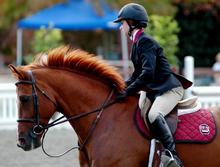 On the equitation circuit, the riders are asked to switch horses at many of their major shows. So how did the girls feel when asked if they could switch horses at AQHA shows? Taylor said that she would love to be able to prove that she could ride all those horses if she switched in the finals at an AQHA show. She thinks that in the pleasure events, it would prove, “We don’t just sit there and look pretty, we work too!” Carey thought it would be a dream come-true. She and her friends have talked about it many times, and think that it would be great!
On the equitation circuit, the riders are asked to switch horses at many of their major shows. So how did the girls feel when asked if they could switch horses at AQHA shows? Taylor said that she would love to be able to prove that she could ride all those horses if she switched in the finals at an AQHA show. She thinks that in the pleasure events, it would prove, “We don’t just sit there and look pretty, we work too!” Carey thought it would be a dream come-true. She and her friends have talked about it many times, and think that it would be great!
What is different about Varsity Equestrian versus competing at AQHA or APHA shows?
The unpredictability is what makes Varsity Equestrian so special and as previously stated, the ability to adjust is invaluable for a collegiate rider. After the random draw the athletes have 4-5 minutes to warm up, figure the horse out and practice any part of the assigned pattern they want. After the warm up, the riders cannot practice anymore; only walking on a loose rein is allowed.
In Varsity Equestrian the riders are not judged on how flashy their horse is, how fancy their clothes are or how quickly they can get through a pattern. Each rider is judged solely on how they handle the horse they drew and the score is given based on the quality and correctness of the rider’s position through each maneuver. So precision, straight lines and correctly executing the assigned pattern is more important than fast spins or brisk transitions. Of course, if you draw a horse that happens to be capable of more advanced movements, it is advised that you perform accordingly. That is most obvious at nationals when many nice show horses are donated for the weekend! Because each ride is scored on a “case by case” basis, it does eliminate the possibility of favoritism, leveling the playing field and allowing for true horsewomen to shine.
What is it like to be a student athlete?
Often the hardest part of being a student athlete is managing your time effectively. However, the transition to a stressful student athlete’s life tends to be a bit easier for equestrians than for some other sports since these women are used to balancing school and other responsibilities with their show careers. These young women are not only an integral part of their team, but somehow they also find the time to be involved in community service and various other campus organizations. With close to 20 competitions a year, these girls are practicing for over an hour 2-4 times a week during the regular season, but they also have mandatory workouts during the week as well. Right before Nationals in April, the number of practices will rise and the intensity of the practices will increase even more.
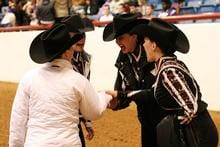 The coaches and athletic staff at each school put an emphasis on the well being of the student athletes. Not only do they want you to be physically fit, but academics are important, if not more important than the competitions. Student athletes will take an 8:00am class, if it allows them extra time at the barn. A student athlete will take tests or quizzes early if she will be missing it for a competition. Student athletes will take a longer class on Thursday so if it is necessary to miss a long weekend for a competition, academics are not compromised.
The coaches and athletic staff at each school put an emphasis on the well being of the student athletes. Not only do they want you to be physically fit, but academics are important, if not more important than the competitions. Student athletes will take an 8:00am class, if it allows them extra time at the barn. A student athlete will take tests or quizzes early if she will be missing it for a competition. Student athletes will take a longer class on Thursday so if it is necessary to miss a long weekend for a competition, academics are not compromised.
Indy handles her hectic schedule by making a list of what she needs to accomplish weekly and sets out goals for each day. She also said that community service is an important part of her team’s (Auburn) mentality. Taylor gives a nod to the athletic support staff at the University of South Carolina. She said she’s lucky to have access to tutors and mentors and that getting her work done is easier, because she really enjoys it!
What are the most enjoyable moments on a varsity team?
There is quite a bit that happens when you are on a Varsity Equestrian team. There are public appearances, practices, competitions and of course schoolwork. However, the girls are quick to identify their favorite part of Varsity Equestrian. Many enjoy the team aspect and they say that riding for the team and fans can be very rewarding. Lauren, the lone senior I spoke with, emphasized the lasting friendships she has made. According to Lauren, “All of the girls on this team mean so much to me and the experience I have shared with them will stay with me for the rest of my life.” Carey favors the unpredictability of the sport, “You have four minutes to ride a horse that you have never been on before and you have no idea what might happen, it’s a challenge and I love it!”
What are some lessons learned while on the team?
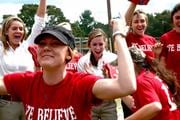 Though a few of these girls have only been riding on a team for a semester, they have already learned life lessons. Taylor emphasized how she learned to be part of a team. She said that since she hadn’t previously shown with a team, it is great to get to cheer on her teammates. Indy said that it has made her mentally tough. She continued to say that collegiate riding has given her a feeling that she has never felt before; there is a team with 39 girls cheering you on and believing in you behind you. “It really means something,” Indy said.
Though a few of these girls have only been riding on a team for a semester, they have already learned life lessons. Taylor emphasized how she learned to be part of a team. She said that since she hadn’t previously shown with a team, it is great to get to cheer on her teammates. Indy said that it has made her mentally tough. She continued to say that collegiate riding has given her a feeling that she has never felt before; there is a team with 39 girls cheering you on and believing in you behind you. “It really means something,” Indy said.
What does the future hold for Varsity Equestrian?
Since Varsity Equestrian is a relatively young sport, it is interesting to get the rider’s perspective on where they believe it is heading. Lauren has been a key rider for UGA for the past four years, and she said that she sees it progressing into a very prominent NCAA sport. Lauren continued to say that the level of riders the sport is attracting is setting the bar higher and higher each year and the competition gets even tougher. As for the events offered at the shows for the western side of the competition, there is only horsemanship and reining. Johnna would like to see trail added to the slate of classes offered at the competitions. Carey wants to see showmanship added because it could be a way to initiate cross over between the English and Western side of the team.
What advice/words of wisdom would you give to riders aspiring to be a part of Varsity Equestrian?
When asked if they could give any advice to younger riders who wanted to ride in college, Johnna advised to keep at it and that it is an amazing opportunity that combines two things all horse show parents love, a great education and watching you show! Lauren said she couldn’t imagine going to school without it. Carey said to work hard in everything you do and to make sure and enjoy the ride. Collegiate equestrian is a wonderful way to combine something you love while receiving a wonderful education. Though it is a little different format than youth riders are normally used to, it can bring out the best in you and allow for experiences and friendships that you would not otherwise have.
If you have any more questions regarding collegiate equestrian, check out www.varsityequestrian.com You may email Katy directly at [email protected].


